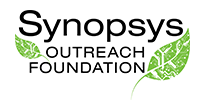Category awards (ribbons, monetary awards, or sponsored trips) valued at approximately $60K are awarded to Synopsys Championship winners as described below. See Award History for previous winners.
- SCVSEFA awards First, Second, and Honorable Mention ribbons based on scientific merit. Approximately 40% of Championship projects receive scientific category awards. Grand prize winners, Isabelle Stone and Castro Family Award winners, and GP alternates automatically receive a 1st Place Category Award.
- Ten to twelve outstanding projects in the high school division (grades 9–12) win Grand Prize Awards and an all-expense-paid trip to the Regeneron International Science and Engineering Fair (ISEF).
- Twelve outstanding projects in the middle school division (grades 6–8) receive the Isabelle Stone Award (biological sciences) or the Castro Family Award (physical sciences) and an all-expense-paid trip to the California Science & Engineering Fair (CSEF) in Los Angeles.
- Selected winners (approximately 10%) in the middle school division (grades 6-8) are eligible to compete in the Thermo Fisher Scientific Junior Innovators Challenge (formerly Broadcom Masters Competition). This competition culminates with a competition for the 30 finalists in Washington, DC, in October.
- About 100 top projects in the middle school and high school divisions are selected to compete in the California Science & Engineering Fair (CSEF).
- In addition, there are more than 40 companies and organizations that sponsor Sponsored Awards to projects that meet their specific criteria (see below).
Sponsored Awards
Approximately 40 companies and organizations select projects to receive Sponsored Awards at the Championship. These awards may include cash, tours, and/or tangible items. Judging for Sponsored Awards is based on the criterion set up by the participating company or organization or individual, and any project may be evaluated by a Sponsored Awards judge. Sponsored Awards judges review only projects with topics that match their areas of interest. Therefore, a student should give his/her project a descriptive title so that Sponsored Awards judges can spot that project based on the title information alone.

